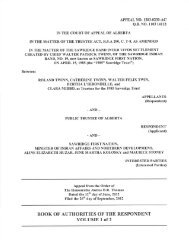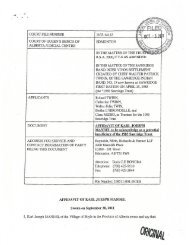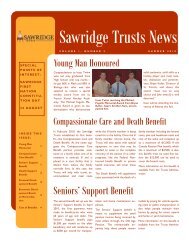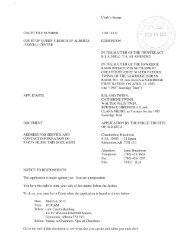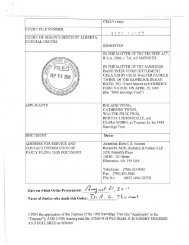31420-12-1 SAWRIDGE, Indian vs. ROLAND, Twinn et al
31420-12-1 SAWRIDGE, Indian vs. ROLAND, Twinn et al
31420-12-1 SAWRIDGE, Indian vs. ROLAND, Twinn et al
You also want an ePaper? Increase the reach of your titles
YUMPU automatically turns print PDFs into web optimized ePapers that Google loves.
F20<br />
1 of these past proceedings involving children who have been taken into care and then<br />
2 because they’re taken into care, the Public Trustee has jurisdiction over them and has<br />
3 certain obligations to them. So we do hear this argument a lot, that the government and<br />
4 the Public Trustee are one and the same. But I think that this court’s made it quite clear<br />
5<br />
6<br />
the Public Trustee is an independent party.<br />
7MS. BONORA:<br />
8<br />
Right.<br />
9THE COURT:<br />
10<br />
Are an independent person.<br />
11 MS. BONORA: I absolutely acknowledge that. Of course, they<br />
<strong>12</strong><br />
13<br />
are funded by the government. So, you know, they’re different --<br />
14 THE COURT:<br />
15<br />
Or not --<br />
16 MS. BONORA:<br />
17<br />
Pardon me?<br />
18 THE COURT:<br />
19<br />
Or not as the case may be.<br />
20 MS. BONORA:<br />
21<br />
Right.<br />
22 The -- and I think the issue is that there’s a public body that’s seeking costs as opposed to<br />
23 an individu<strong>al</strong>, right? Very different, and I’m going to g<strong>et</strong> into this in a bit more d<strong>et</strong>ail<br />
24 later, but certainly different than many of the cases cited when we look at the Okanagan<br />
25 case or the Little Sisters case where you had individu<strong>al</strong>s who couldn’t proceed. Here, I<br />
26 think the Public Trustee certainly has the ability to proceed. Certainly has the resources to<br />
27 proceed. It may be that they are awarded costs at the end of the day. And that’s<br />
28 som<strong>et</strong>hing we’re not going to decide today. And I would certainly agree that may well be<br />
29 the case, that at the end of the day after the Court has heard their arguments, they may<br />
30 decide that they were essenti<strong>al</strong> to be here and that they may be awarded costs at that time.<br />
31 We’re suggesting that they don’t g<strong>et</strong> into the cases and into the test that is required for<br />
32<br />
33<br />
advance costs.<br />
34 THE COURT: Okay. And here’s the other question I had.<br />
35 You know, you t<strong>al</strong>ked about the parens patriae jurisdiction of the court. And I certainly<br />
36 take your point that there are going to -- wh<strong>et</strong>her the Public Trustee is here or not, there<br />
37 are going to be many participants in this, or a number of participants, who can raise<br />
38 arguments. But one of the concerns I’d have, certainly you can raise arguments and de<strong>al</strong><br />
39 with leg<strong>al</strong> issues, but who’s to go out and g<strong>et</strong> the evidence? Imean, that’s one of the<br />
40 problems the court’s <strong>al</strong>ways faced with is g<strong>et</strong>ting the evidence. I mean, we -- the court<br />
41 has no independent ability to g<strong>et</strong> that. We depend on parties to bring evidence forward.



